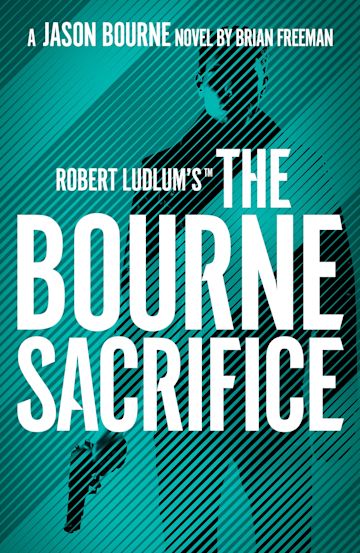BRIAN FREEMAN is an award-winning American psychological thriller writer whose books have been sold in 46 countries and published in 23 languages. He was named by Putnam and the Robert Ludlum estate as the official author to continue Ludlum’s ‘Jason Bourne’ franchise.
As AKINA HANSEN writes, Brian’s third novel in his ‘Bourne’ series, The Bourne Sacrifice, is an action-packed mystery.
Jason Bourne is a name most people are familiar with. Originally created by author Robert Ludlum in the 1980s, the ‘Bourne’ books and their many iterations have captivated readers for decades.
Recently we’re seeing more and more authors continue on the stories of existing characters. And while few of these adaptations have gone on to achieve both commercial and literary success, the ones that have include James Bond, Jack Ryan, Jack Reacher and, of course, Jason Bourne.
A long-time fan of the series, bestselling and award-winning author, Brian Freeman, can vividly remember at age 17 reading The Bourne Identity in 1980 when it first came out. So when he received a call from his agent telling him, ‘Putnam wants you for Bourne’, it was a no brainer for him. He accepted the offer and since 2020, Brian Freeman has taken on the ‘Bourne’ legacy and has published the following in his Bourne series: The Bourne Evolution, The Bourne Treachery, and most recently The Bourne Sacrifice.
I wanted to be able to build plots that felt ripped from the headlines …
‘I always pictured The Bourne Evolution as kind of an homage to Ludlum and a tribute to the very first book, The Bourne Identity,’ says Brian.
Considering the many versions of Bourne that fans have come to know – from Eric Van Lustbader’s books to the Matt Damon films – it made the most sense to Brian to be true ‘to the man you meet in The Bourne Identity.’
Brian introduces us to assassin Jason Bourne, a man reminiscent of Ludlum’s original character who years earlier survives a bullet to the head during a covert mission. Despite surviving, the trauma to his brain erases the memories of his past and therefore his identity.
He’s a man with no history, a fractured personality and a complex psychology. Perhaps this is indeed what makes Bourne such an enduring figure in literature. ‘Bourne is constantly searching for who he is, and I think that’s a search everyone can relate to,’ Brian says.
Similar to Ludlum, it was important to Brian to create characters who had a wide range of motivations and moral standards and were therefore reflective of society.
‘If you’re looking for superheroes or supervillains, if you’re looking for people who are all good or all bad, I just don’t think you’re going to find many examples of that in humanity. And that’s honestly why you don’t find many of those kinds of people in my books. I think we’re all shades of grey and we all labour to be better people, but we make mistakes along the way.’
In fact, there are many parallels between Brian’s books and the originals. Ludlum’s series were set and born out of the Vietnam and Watergate era and were therefore informed by the tumultuous social climate of the time. The original books were characterised by issues surrounding a distrust of government and economic upheaval, not unlike Brian’s own books.
The Bourne Sacrifice is a compelling and pacey spy thriller that follows Jason Bourne and journalist Abbery Laurent as they tackle a global media conspiracy and track an assassin who claims to have answers about Bourne’s past. Set against a modern backdrop, the novel looks at real social and political issues – ranging from the recent pandemic, through to the rise in the spread of misinformation, and finally the public’s increasing concern over the misuse of technology and data.
Brian tells me, ‘I wanted to be able to build plots that felt ripped from the headlines in the same way that a lot of Ludlum plots did, where the readers would read the book and wonder, “Well, is that the way it really happened?”’ At the beginning of the novel, we quickly learn that a conspiracy is at work with the death of a young German woman. She is murdered in Washington on her way to a covert meeting, and subsequently her real identity and the truth behind her murder is suppressed. When Jason and Abbey begin investigating the crime, they get embroiled in a larger conspiracy of blackmail, murder and manipulation.
Over the course of the book, Brian explores the weaponisation of technology and how it’s used to manipulate the media.
‘I started thinking a lot about the question of faith and truth in the media, and how the online presence has done so much to erode people’s confidence. Also how there’s so much misinformation and disinformation being spread around.’
In The Bourne Sacrifice a group called the Pyramid uses technology such as deepfakes and social media to manufacture lies with the objective to undermine democracy, discredit people, shape legislation, sway elections, erode the public’s trust in journalism and to further polarise people.
Brian clearly taps into a very real concern surrounding privacy and the misuse of our data by Big Tech, stating, ‘I think what I talk about in The Bourne Sacrifice only begins to scratch the surface of what is possible with technology.’
This is particularly relevant when we consider the 2018 Facebook and Cambridge Analytica scandal and the rise in deepfake technology in 2017.
… sometimes a deeper truth can be found in fiction.
Deepfake technology uses a form of artificial intelligence called deep learning to create realistic looking photos and videos of people doing and saying things that they have in fact not done or said. Disturbingly, anyone with a computer and access to the internet can create these videos.
Now, if you’ve spent even a small amount of time on social media, you’re probably aware of several deepfake videos that have gone viral (and if you’re not aware, a quick Google Search will enlighten you).
A particular trend we’re seeing at the moment is celebrity deepfake videos on TikTok featuring famous actors such as Tom Cruise, Keanu Reeves and Robert Pattison. Admittedly these videos are lighthearted and silly – but imagine then, the possibilities of deepfake technology being used as a form of political blackmail and manipulation. This is exactly what Brian highlights throughout his book, importantly noting, ‘What technology can do is extraordinary, the danger of course is: has our moral compass kept pace with what our technological capabilities allow us to do?’
When several characters in The Bourne Sacrifice are discredited by the Pyramid group through the use of this technology and social media hacking, Abbey and Bourne are further empowered to expose them.
It’s in this space that Brian introduces us to an important character, Peter Chancellor, a novelist who writes about events that unfold in the series. Fans of Ludlum will know that this is a nod to The Chancellor Manuscript which is one of Brian’s all-time favourite Ludlum novels.
Brian tells me that in the book ‘Chancellor talks about the idea that in some ways, it’s safer to write these things as fiction, than it is to try to tell the truth. And that sometimes a deeper truth can be found in fiction.’
When asked if he felt that fiction was a better medium to reach people, Brian replied ‘I think fiction allows you to raise a lot of interesting issues without feeling like we have to give people a black or white answer. And if they know it’s not intended to be true, maybe they can actually find a deeper truth underneath it.’
The Bourne Sacrifice is filled with elaborate action scenes, crimes and a host of compelling and complex characters. If you’re a fan of the thriller genre or a fan of Jason Bourne, you’ll enjoy this reboot and its references.






